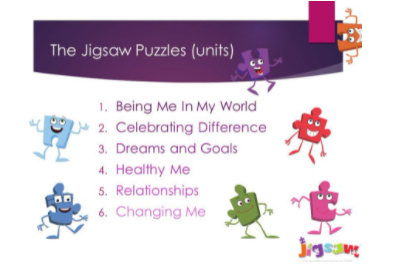PSHE (Physical, Social, Health and Economic Education)
St Edward's - A caring Christian Community where children achieve their potential, are confident in themselves and their abilities and are set on a positive path for life.
A growing body of research shows that pupils who are emotionally healthy do better at school. PSHE education helps children and young people to achieve their potential by supporting their wellbeing and tackling issues that can affect their ability to learn, such as anxiety and unhealthy relationships.
The PSHE Association
We are extremely proud that St Edward's is known for its nurturing ethos. We place high value on developing the 'whole child'. We care about our pupils and know that children struggle to learn effectively if they are not given the space to learn social skills or develop emotional regulation or self-efficacy. 
Our PSHE lessons give us the opportunity to explicitly teach children how to keep themselves safe and to understand their relationships with others.
The PSHE Curriculum at St Edward's
We have introduced a whole school PSHE scheme called Jigsaw. Jigsaw combines PSHE, emotional literacy, mindfulness, social skills and spiritual development.
Jigsaw is designed as a whole school approach, with all year groups working on the same theme (Puzzle) at the same time.
Jigsaw aims to help children know and value who they are and how they relate to other people in this ever-changing world.
There are six 'Puzzles' (half-term units of work), each with six 'Pieces' (lessons). Each year group is taught one lesson per week and all lessons are delivered in an age- and stage-appropriate way so that they meet children’s needs.
The different puzzle pieces are:

We also use My Happy Mind lessons to build resilient, balanced and happy minds at home and at school - see our Mental Health page for more information.
Relationships & Sex Education
An important part of the Jigsaw PSHE programme is delivered through the 'Relationships' and 'Changing Me' puzzle pieces, which are covered in the summer term.
There are four main aims of teaching RSE:
• To enable children to understand and respect their bodies
• To help children develop positive and healthy relationships appropriate to their age and development
• To support children to have positive self-esteem and body image
• To empower them to be safe and safeguarded
Each year group will be taught appropriate to their age and developmental stage.
Below is a summary of RSE coverage within the Jigsaw scheme for each year group:
• Foundation Stage - Growing up: how we have changed since we were babies
• Year 1 - Boys’ and girls’ bodies; naming body parts
• Year 2 - Boys’ and girls’ bodies; body parts and respecting privacy (which parts of the body are private and why this is)
• Year 3 - How babies grow and how boys’ and girls’ bodies change as they grow older
• Year 4 - Internal and external reproductive body parts, body changes in girls and menstruation
• Year 5 - Puberty for boys and girls
• Year 6 - Puberty for boys and girls and understanding conception to birth of a baby
A Curriculum for Our Pupils
We have identified some core barriers that the children of our school face when they are accessing the curriculum, and we intend to deliver the PSHE curriculum with an approach that addresses these:
- Vocabulary – we ensure that all aspects of the curriculum are planned with careful and appropriate vocabulary progression, creating cross-curricular opportunities for consolidation where appropriate.
- Communication and teamwork skills – our PSHE curriculum provides many opportunities for discussion. Children are encouraged to express their thoughts and opinions on a range of topics.
- Resilience – we design challenging tasks in our PSHE curriculum, allowing children to experience failure and errors in a safe environment, scaffolded by the implementation of growth mindset training.
- Life experiences to contextualise learning – we encourage children to reflect on their own experiences and affirm parental engagement and involvement. This may include practical advice, parent workshops or an overview of requirements regarding withdrawal of pupils from sex education.
A Curriculum for All Pupils
Ambition
Our ambition in PSHE for children with SEND is broadly in line with our ambition for all children.
We want all children to be able to decide upon and share their opinion. We would like them to know how to express why they feel the way they do.
We aim for all children, regardless of their attainment level, to know that their opinion and contribution is valued and valid.
We want all children to have strategies to keep safe and happy and to know how to seek help/support if they consider themselves not to be.
Access (How we may support children with SEND to achieve in PSHE)
-
Model and scaffolding forming opinions - providing appropriate sentence stems or vocabulary when necessary
-
Careful consideration is given to talk partners - not simply pairing children with SEND with academically higher achieving students but students whose characteristics would engage, support, mentor and encourage these students to form and share an opinion
-
Ensuring the classroom culture is established so that share time is a 'safe space' - clear rules for ensuring this are recapped / shared before each session
-
Using community circle or a 'sharing object' that is passed around the group so that each child is given equal opportunity to talk and be heard
-
Revisiting ways to stay physically, emotionally and mentally safe and what they can do if they are not
-
Providing visual support e.g. pictures of people who can keep them safe / provide support at school etc
Assessment in PSHE
Why do we assess in PSHE?
At St. Edward’s, we believe that Assessment is central to effective teaching and learning in PSHE Education.
Our approach to Assessment is based on the following underlying principles:
• It is important for pupils to have opportunities to reflect on their learning, especially when that learning relates directly to the individual’s identity – their personal qualities, attitudes, skills, attributes, achievements and influences.
• It is important for teachers to feel confident that learning has taken place, to be able to demonstrate progress, and to identify future learning needs.
• Assessment increases pupils’ motivation and improves learning, as their increased awareness of their own progress and development illustrates the value of their learning.
• It allows the leadership team, parents, governors and school inspectors to see the impact PSHE education is having for pupils and for whole-school outcomes, such as Ofsted judgements on personal development, safeguarding, SMSC development and the promotion of fundamental British values.
Personal attributes, so central to PSHE education, are arguably the hardest aspects of learning to assess. It is difficult for teachers to accurately assess a pupil’s self-confidence or sense of their own identity and values. However, pupils themselves will be able to judge, for instance, whether they feel more confident, or have a firmer sense of their own beliefs and opinions than they did before a particular series of lessons. Such personal reflection in PSHE education lessons is essential, so ensuring pupils have time and space within the lessons to reflect on this, either privately or through discussion, is a vital part of the assessment process.
Assessment Strategies:
- Teacher Feedback books updated weekly after each session
- Pupil Assessment - children should develop the ability to observe and feed back to their peers using precise and specific language
- Observations and in the moment feedback
- Written tasks – evidenced in Floor-books


